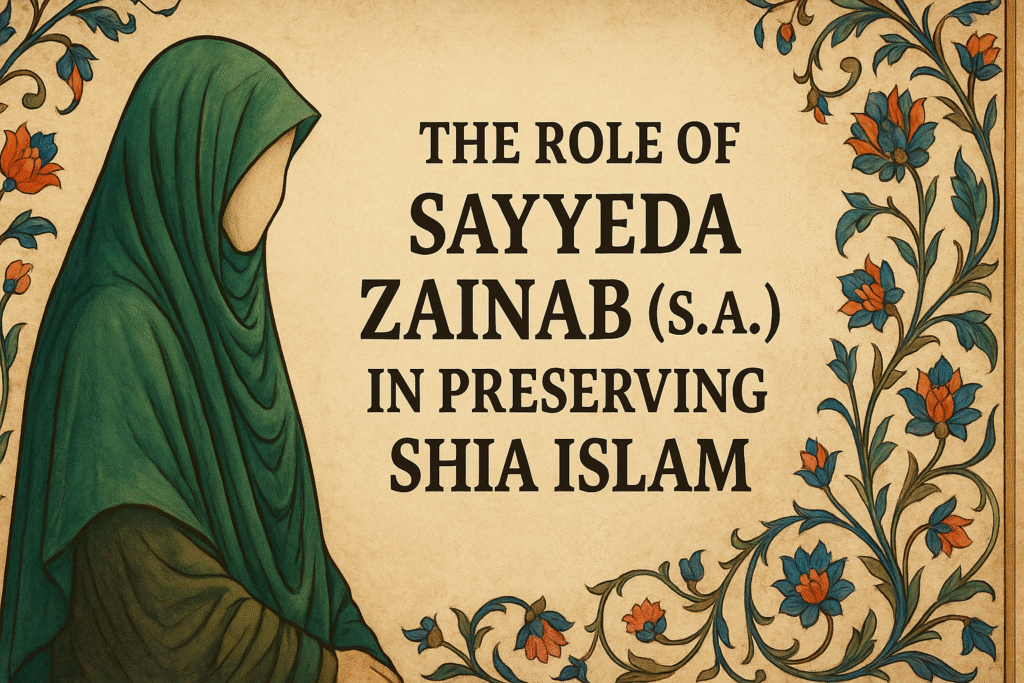Introduction
Throughout Islamic history, certain individuals have stood out not only for their piety and faith, but for their unshakable courage in the face of oppression. Among them, Sayyeda Zainab (S.A.), the granddaughter of Prophet Muhammad (PBUH), shines as a beacon of resilience, wisdom, and spiritual strength. After the tragedy of Karbala, it was her leadership, eloquence, and fearlessness that carried the message of Imam Hussain (A.S.) across generations and geographies.
In this article, we explore how Sayyeda Zainab (S.A.) played an essential role in preserving the message of Karbala, shaping the spiritual and political identity of Shia Islam, and empowering generations of believers through her unwavering stance against tyranny.
Focus Keywords: Sayyeda Zainab role in Shia Islam, Karbala aftermath, Shia history, Zainab bint Ali
Table of Contents
- Historical Background
- Spiritual and Religious Significance
- Sayyeda Zainab’s Sermons and Public Resistance
- Preserving the Message of Karbala
- Legacy and Modern-Day Relevance
- Conclusion
Historical Background
Sayyeda Zainab (S.A.) was born in Medina in 5 AH to Imam Ali ibn Abi Talib (A.S.) and Sayyeda Fatima al-Zahra (S.A.), making her the beloved granddaughter of the Prophet Muhammad (PBUH). Raised in the household of revelation, she inherited the knowledge, eloquence, and courage of her father and mother.
She was married to Abdullah ibn Ja’far al-Tayyar and lived a life of devotion and service. However, her most defining role emerged during the events of Karbala in 61 AH, where she witnessed the brutal martyrdom of her brother Imam Hussain (A.S.) and the massacre of his companions.
After Karbala, Sayyeda Zainab (S.A.) became the de facto leader of the surviving family members, especially the women and children. From Karbala to Kufa, and then to the court of Yazid in Damascus, she bore the flag of truth, justice, and the legacy of her brother’s sacrifice.
Spiritual and Religious Significance
Sayyeda Zainab (S.A.) embodies the perfect blend of intellect, spirituality, and resistance. Her knowledge of the Quran and Hadith is evident in her speeches, which reflected deep understanding and divine wisdom.
Shia scholars regard her as the first mubaligha (female preacher) of Shia Islam. Her actions and words after Karbala were pivotal in preserving the faith, especially at a time when tyrannical regimes were trying to rewrite Islamic history.
Many Hadiths and narrations mention her deep devotion to prayer and worship, even in the most painful circumstances. For instance, it is recorded that she continued to perform Salat al-Layl (night prayers) in the prison of Damascus, despite her injuries and grief.
Sayyeda Zainab’s Sermons and Public Resistance
One of the most profound contributions of Sayyeda Zainab (S.A.) was her public oratory. In the court of Ibn Ziyad in Kufa and Yazid in Damascus, she delivered sermons that shook the conscience of even her enemies.
Sermon in Kufa
In Kufa, addressing a crowd that had betrayed Imam Hussain (A.S.), she said:
“O people of Kufa! O people of deception and betrayal! Are you crying? May your tears never dry, and may your wailing never end. You have killed the son of the last Prophet and left a stain upon your souls.”
Sermon in Damascus
Before Yazid, she boldly stated:
“O Yazid! Do you think that you have achieved victory? Your days are numbered, and your power will crumble. You have not achieved glory, but disgrace.”
These sermons were not only acts of defiance but also platforms to educate the public about what truly transpired at Karbala. Her eloquence countered the Umayyad propaganda, and her courage became a symbol of resistance.
Preserving the Message of Karbala
Sayyeda Zainab (S.A.) ensured that the sacrifices made on the plains of Karbala were not buried under the sands of time. Through her:
- Narration of events: She became the first eyewitness to recount the events of Ashura, ensuring an authentic transmission of history.
- Spiritual leadership: In the absence of Imam Hussain (A.S.), and with Imam Zainul Abideen (A.S.) ill, she assumed spiritual and moral leadership of the caravan.
- Community formation: Her efforts laid the foundation for the Shia community to mourn, remember, and learn from Karbala through Majalis and Ashura gatherings.
Legacy and Modern-Day Relevance
Today, Sayyeda Zainab (S.A.) is revered not only as a historical figure but as a model for Islamic leadership, female empowerment, and moral integrity. Her shrine in Damascus is a spiritual center for millions of pilgrims who seek inspiration from her courage.
In modern times, women scholars, orators, and activists across the Shia world often cite her as their role model. From Najaf to Karachi, London to Los Angeles, the legacy of Zainab bint Ali (S.A.) is alive in the hearts of those who stand against injustice.
Her story continues to empower the oppressed, reminding believers that truth, no matter how outnumbered, is never defeated.
Conclusion
Sayyeda Zainab (S.A.) was more than a sister of a martyr — she was the voice of Karbala, the guardian of truth, and a pillar of Shia Islam. Through her eloquence, patience, and steadfastness, she preserved the message of Imam Hussain (A.S.) and ensured its eternal relevance.
Her legacy lives on in every majlis, every lamentation, and every act of resistance against tyranny. For Shia Muslims and the wider Muslim Ummah, Sayyeda Zainab (S.A.) remains a guiding light — showing us that even in the darkest times, truth and faith can never be silenced.
Also read:

